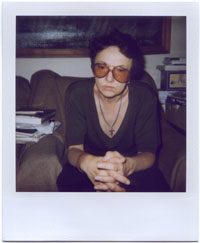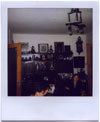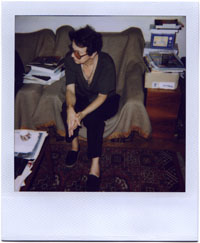Alexandra Titu
Interview with Alexandra Titu
- Do you find there is a context for contemporary art in Romania?
 The
problem is quite complex, but in Romania, where Byzantine universalism and Western
civilization meet, how should I say - here there are more types of culture.
I think that what has been happening lately is the struggle of the person who
is really involved in the field of culture, to submit to what is very simple
and muddy in the tendency of globalization. The universal and the global 0-
the universal is always a tendency imposed from above. Even the latest universalism
is coming from above, modernism comes from above. Spiritualism on the other
hand is understood on a different level.
The
problem is quite complex, but in Romania, where Byzantine universalism and Western
civilization meet, how should I say - here there are more types of culture.
I think that what has been happening lately is the struggle of the person who
is really involved in the field of culture, to submit to what is very simple
and muddy in the tendency of globalization. The universal and the global 0-
the universal is always a tendency imposed from above. Even the latest universalism
is coming from above, modernism comes from above. Spiritualism on the other
hand is understood on a different level.
The person remains marginalized, excluded, the person involved in art. After
40-50 years of submission, there is another wish to submit once again. A new
social justification, a different dress, a mask, a fear of being yourself. That's
how a doubt and a wish to manipulate come about, a which to have some values
that can justify tradition, to find mechanisms, ways…
You have to see feminism in this zone of maximum pressure that leads to inter-gender
war. The universal does not create anything superfluous. Men are a necessary
type, and traditional family ties are far from out of fashion, forbidden or
rejected. In my opinion family ties are still important. They are a structure
on the basis of which various freedoms can form and appear. This is a contemporary
problem that society poses itself once again. I had an interesting experience
with social groups of disables persons who have been marginalized and have not
succeeded in integrating themselves into society. One of their fundamental problems
was the lack of healthy family ties.
It's very easy to struggle against the superfluous when you are rich. It's
very easy to be outraged when you are surrounded by love. It's very easy to
be skeptical towards culture when you have grown up in the middle of much culture.
It's easy to be critical when you have all that.
When you are marginalized, when you live in poverty, in the subcultural canals,
the real canals, with a total lack of love, among the lowest passions of violence
in everyday life, and that is the moment in which a sadistic guy prevented from
developing by the lack of love kills you in the woods…
Then the problem of the family presents itself in a different way, for the
protection of the child. In Antiquity, we have at our disposal the model left
by Sparta, in which children are educated in a monotonous way, towards social
submission and physical strength. This cannot be compared to the model inherited
from Athens. The freedoms linked to the family in Athens have been marginalized
in Athens itself. This is a different model, which needs to be studied in-depth
all over again.
I think that the family is very important for the couple. For partnership,
which is a very risky zone, it is a stabilizing factor. It helps to have a given
weight in a context. I oppose the existence of a concentrated world. Atoms need
bonds. I prefer water to the separate elements (oxygen and hydrogen). This applies
to the family, too.
When you are strong you can fight. If you have ideals, you are ridiculous,
but only in the contemporary context. What I say about the couple applies also
to other types of ties. In the couple, purely sexual bonds are overcome, and
we reach emotional bonds. In this context I would like to mention Torres, who
was homosexual. When his long-time partner died of AIDS, he exhibited photographs
representing the empty bed with naked, painful sensitivity. These photographs
called up rather thoughts and associations of the pain from the emotional loss
of the beloved person, and of family, coziness, closeness, mutual trust, love
in its cleanest form. This was not a symbol of a sexually frustrated personality,
but of a personality emotionally hurt by the loss of the beloved person.
The family is the first unifying element in a model. Around the family, other
types of ties can be organized. This does not mean that I don't believe in freedom.
I feel much more free after I got married. I then had the possibility to have
various friends from the position of a married woman.
 The
family is an economic protection, but in the first place it is an emotional
protection. Of course there are families in which there is terror, but this
means we have to ask the question who creates this terror. We need to keep in
mind also social pressure. In such cases, the lack of family is in no way a
protection. There are cases of good relations within families that are socially
disadvantaged. Poverty is not always a defect, such things do happen throughout
the world, even if they are in contradiction with the new economic model. On
the economic level, the emphasis on power relations is the fundamental defect
of the postmodern explanation of the world. Beginning with the power of the
father within the family, and all the way to economic problems and pressure.
Freedom is a risk (freedom is responsibility and power), but it does not protect
from stupidity, doubt, economic problems, death, etc. The truly free person
can both take responsibility for the family and completely consciously choose
loneliness.
The
family is an economic protection, but in the first place it is an emotional
protection. Of course there are families in which there is terror, but this
means we have to ask the question who creates this terror. We need to keep in
mind also social pressure. In such cases, the lack of family is in no way a
protection. There are cases of good relations within families that are socially
disadvantaged. Poverty is not always a defect, such things do happen throughout
the world, even if they are in contradiction with the new economic model. On
the economic level, the emphasis on power relations is the fundamental defect
of the postmodern explanation of the world. Beginning with the power of the
father within the family, and all the way to economic problems and pressure.
Freedom is a risk (freedom is responsibility and power), but it does not protect
from stupidity, doubt, economic problems, death, etc. The truly free person
can both take responsibility for the family and completely consciously choose
loneliness.
This fixation on the material is limiting us - to seeing it as a source of
calmness which allows us to work creatively, to feel free. This is worries us,
something which has to be created in addition becomes a defect. Postmodernism
is a contemporary reediting of the Baroque. Constantly, this need arises to
elevate and glorify art, to be interested in exceptional situations. We discover
the same spirit of mining and setting up traps.
The person involved in culture and art can always emigrate and integrate in
a culture that is foreign and new for them. For instance, a Romanian artist
emigrates to Paris, and after a time becomes a French artist of Romanian origin.
A culture, on the other hand, can never emigrate. An American culture cannot
integrate itself in Romania, or vice versa. Globalism started as a financial
strategy, which turned out to be defective. Look at the problems in America
now, which has discovered racism again, or the demonstrations in Pakistan against
America, all this is the result of the system falling apart, not being able
to resist its own pressure.
When we speak about feminism, I see a link to ideology. My interest is natural.
I find myself in my own context, while feminism finds itself in a stronghold
that needs to be taken over, so that the specter of the previous inhabitant
keeps roaming around.
- How are the roles and responsibilities traditionally distributed in the
family couple in Romania?
The woman is the one who deals with maintaining order in the house, the kids,
cooks…
The man is traditionally the one who contributes a higher income for the family,
fixes the faucets in the bathroom, does the shopping…
- Does the shopping? Women carry a much bigger load in their everyday lives,
the great struggle with everyday things falls mainly on them, and at the same
time they have to go to work, not out of their own free choice but due to economic
needs of the family, from work back home and then you sleep, and again to work…
Doesn't this represent a typical example of a patriarchally structured East
European family?
Yes! But only at first sight. Things are not quite like that in Romania. If
our society was more normal, or there was a more normal economic system, maybe
you would be right. But if we take as an example the period of the great crisis
of 1983, going shopping and finding products, food products, was equal to hunting
in the stone ages. While the woman was staying in the cave, the man had to find
prey, food in the hostile outer environment. In the shops there was nothing,
people had to wander around for hours or to hang around all day queuing in order
to find food products of first necessity, elementary things that their children
and families need on a daily basis. You did not shop for food, you looked for
it and got it after great efforts and even risks to your life. I became witness
of a fight with frozen chickens in a supermarket. When it became clear that
their number is limited and there will not be enough of them for all the irritable,
hungry people having waited for hours, a real fighting ground materialized.
Everyone was trying to get their hands on the prey, risking their lives in the
hope to be able to feed their families. So that shopping was in every sense
of the word a struggle for survival. Now the problems are different. In the
shops you can find anything you want, they are well supplied, but people can't
afford elementary things. Now, even more complicated social situations and pressure
make their appearance, which are hard to classify. For instance, the problem
of unemployment. Men are its most obvious victim. Certain professions disappear,
certain categories of labor, and the system does not provide alternative options.
It is very difficult to change a man through text and ideology. To change him
into a dependent personality, to force him to submit to the women… This
dependence of the unemployed man sitting at home, dependent economically and
emotionally on the women, calls forth yet more domestic, everyday violence.
 -
In Bulgaria there is a similar problem. When men lose their job, in most cases
not only the economic problems fall upon the woman, but usually she also has
to take upon herself most of the moral guilt for the deadlock situation that
has arisen. This means that she has to bear the moral and physical punishment.
Even men with a higher education who understand that their wives are in no way
personally guilty of the situation in which they find themselves, sitting at
home without a job for extended periods of time, definitely refuse to take on
the role of the "house-wife" in the family in order to ease the tension.
On the contrary, with great pleasure they indulge themselves in various forms
of depression, manias, phobias, violence, and unfaithfulness. Perhaps for many
families this leads to heavy social, psychological and sexual problems and complete
falling apart, a vicious circle of everyday personal violence from which in
many cases there is no escaping?
-
In Bulgaria there is a similar problem. When men lose their job, in most cases
not only the economic problems fall upon the woman, but usually she also has
to take upon herself most of the moral guilt for the deadlock situation that
has arisen. This means that she has to bear the moral and physical punishment.
Even men with a higher education who understand that their wives are in no way
personally guilty of the situation in which they find themselves, sitting at
home without a job for extended periods of time, definitely refuse to take on
the role of the "house-wife" in the family in order to ease the tension.
On the contrary, with great pleasure they indulge themselves in various forms
of depression, manias, phobias, violence, and unfaithfulness. Perhaps for many
families this leads to heavy social, psychological and sexual problems and complete
falling apart, a vicious circle of everyday personal violence from which in
many cases there is no escaping?
In this situation I tend to understand men and even to exculpate them. The
miners, of which there are two million in Romania, are one of the groups that
have suffered the most from this situation. In entire regions in the province
this was the main source of income for people. Now the mines are going out of
business, and in many families the men lose their jobs. The miners are very
dependent on their status. They cannot change, because they don't have a sufficiently
refined education, culture and context. They suffer from the collapse of a social
system that is falling apart without leaving any alternative but existence on
the lowest level of everyday survival. This can also happen to a woman, in a
completely different social context. When the world suddenly and unexpectedly
collapses around you. This has happened to me. When I became ill, I started
having problems with my eyes, I started losing my eyesight. My work is connected
to text, as a writer, philosopher, theorist and critic. My entire world fell
apart. I could have retired, stopped working, renounced the struggle and indulge
in desperation. A "friend" even proposed that I retrain myself and
learn to embroider and knit, arguing how well blind people can deal with this
type of work. I chased her away. I could not accept that everything was over,
that I would have to give up my favorite work, everything that gave sense to
my life. After the problems with the illness, the problems with the eyes, I
wrote some of my best texts and books, curated exhibitions, I continue to teach
at the university. For economic reasons I could not afford to hire someone to
help me with my work, and the greatest part of it fell onto my family. In order
for me to be able to continue working, I needed help. I turned into a monster,
started terrorizing my entire family, of course without beating them, they were
forced to read corrections and to do many other things connected to my work
and to myself, entire nights on end.
During the 19th century, the women in Romania were quite emancipated
for their time. In the circle around the queen, the model was quite close to
the French. This of course applied to the elite, but even in the lower classes
there was a wave of women who chose and practiced men's professions. The first
pilot was a Romanian. Many family names show a matriarchal link. Of course I
don't want to idealize our history, neither today's situation with respect to
these questions. But I can say that the sexual scandal and violence have kept
culture moving ahead. When we speak about the feminine situation and the situation
of women, we discover a projection of the male. Feminism tries to take the position
of power, to express itself in the male. I do not want to express any given
ideology with my work, but to present a position, a complete overcoming of the
situation of women. To be involved in art, to express your own views, without
a link to any ideology. "I am culture, and she is a woman."
Dimitrina Sevova - In Someone Else's Skin (2001)
Index of the Interviews
 The
problem is quite complex, but in Romania, where Byzantine universalism and Western
civilization meet, how should I say - here there are more types of culture.
I think that what has been happening lately is the struggle of the person who
is really involved in the field of culture, to submit to what is very simple
and muddy in the tendency of globalization. The universal and the global 0-
the universal is always a tendency imposed from above. Even the latest universalism
is coming from above, modernism comes from above. Spiritualism on the other
hand is understood on a different level.
The
problem is quite complex, but in Romania, where Byzantine universalism and Western
civilization meet, how should I say - here there are more types of culture.
I think that what has been happening lately is the struggle of the person who
is really involved in the field of culture, to submit to what is very simple
and muddy in the tendency of globalization. The universal and the global 0-
the universal is always a tendency imposed from above. Even the latest universalism
is coming from above, modernism comes from above. Spiritualism on the other
hand is understood on a different level. 
